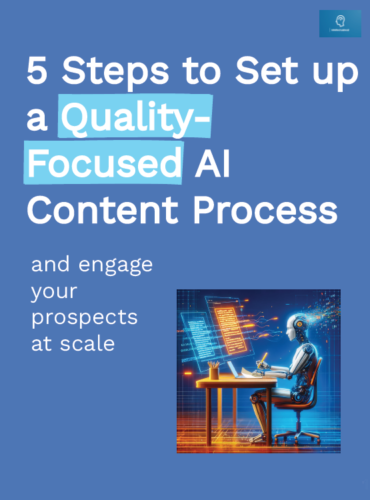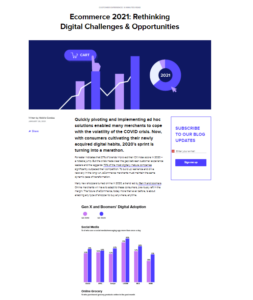Since Google announced the beta release of the Search Generative Experience (SGE), marketers have been pondering the implications for their inbound strategy.
Google Search is among the most critical marketing channels, bringing 53.3% of all website traffic (BrightEdge). SGE is meant to transform the behavior of all these search users and affect key web marketing metrics.
It’s no wonder that SEOs and Content marketers have been worrying about how to adapt to these changes.
Here’s what we know so far about the marketing impact of SGE and what you can do to prepare for the general release of SGE.
What is Google’s Search Generative Experience?
Following the paths of Open AI and Bing Chat, Google introduced in May 2023 a new version of its search engine powered by generative AI.
What it calls “Search Generative Experience” provides an AI-based summary of users’ queries to make user search as fast and relevant as ever. Google released only a beta version that can be tested by registered users in the US and in some Asian countries.
The new Google interface includes 3 main new features :
- AI snapshot: When typing open-ended questions, the user gets a condensed summary of the answer above the traditional search results. 3 additional references and sources are usually displayed on the left side of the snapshot.
For example, if you ask the AI about the fastest land animal, you get a detailed snapshot like this :
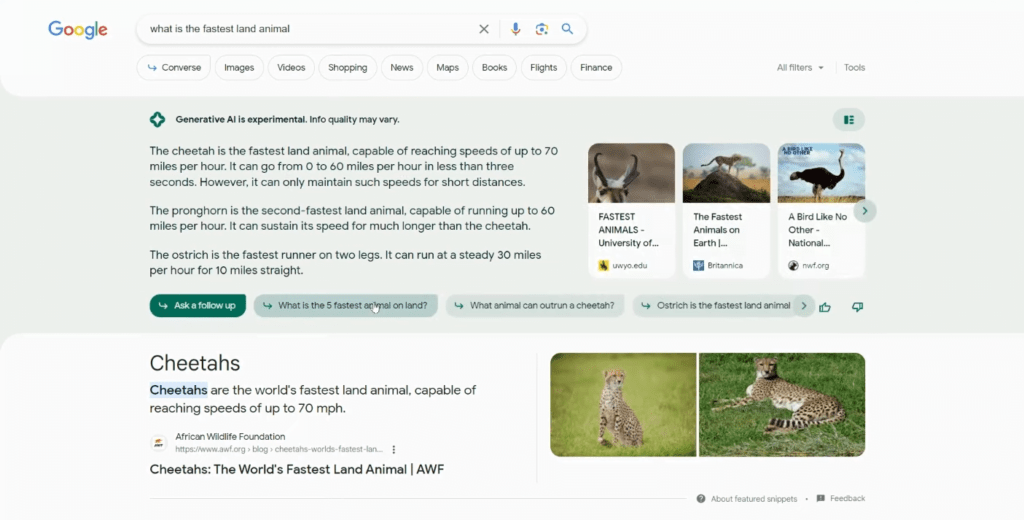
- Conversational mode: Users can ask follow-up questions to the AI and get additional information in the “Converse” tab. There are usually recommended questions appearing at the bottom of the AI snapshot to get a conversation going.
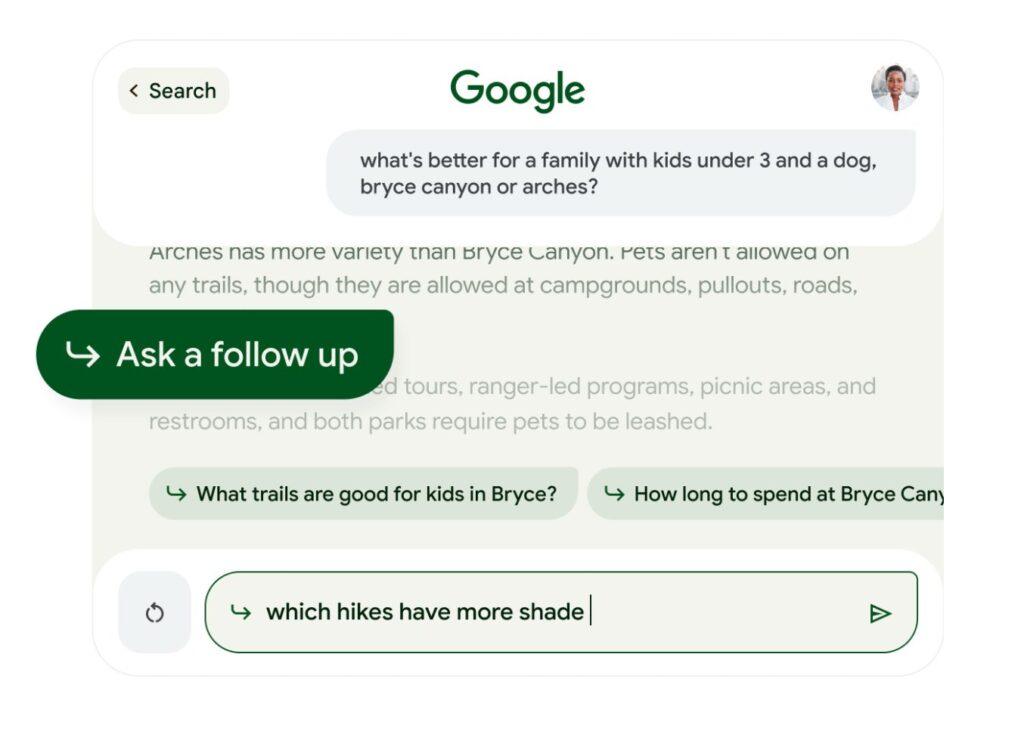
- Vertical experiences: During commercial and local searches, the AI provides a more extensive list of product visuals and details. The AI gives some comments about each of the products/locations to help you make a choice.
For example, if you are looking for the best restaurant for a group dinner in Chicago you get results like this :
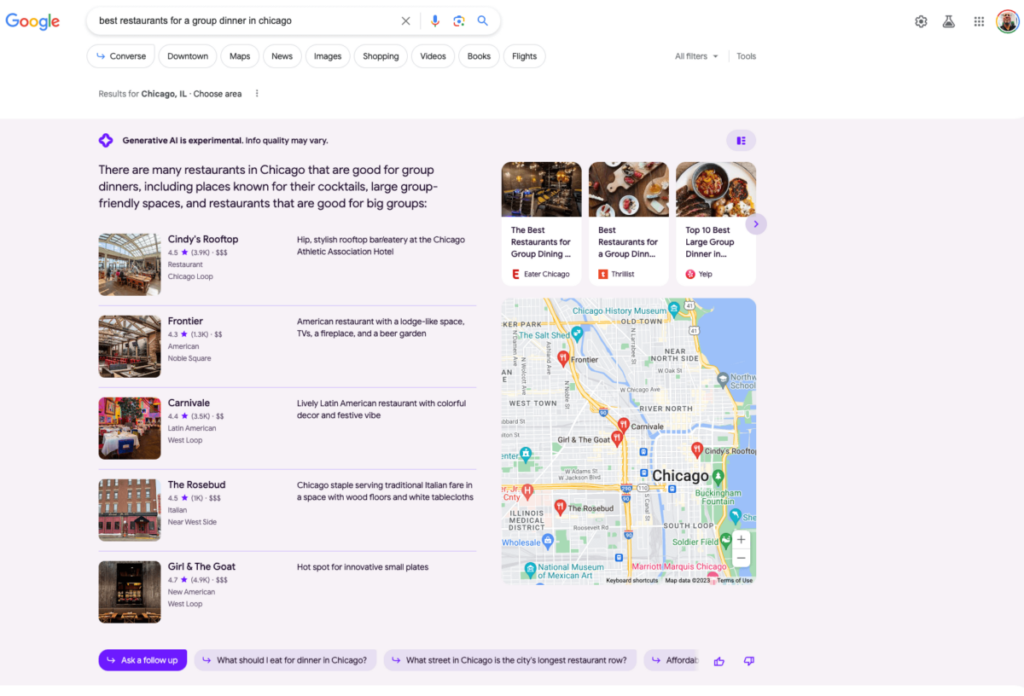
What’s the impact of the Search Generative Experience?
Such a new Google experience will significantly affect user behavior. While users clicked through several results to get the perfect answer, they will now get it instantly on the Google interface. They won’t necessarily need to visit the websites, and rely more and more on Google’s generative AI for even more personalized answers.
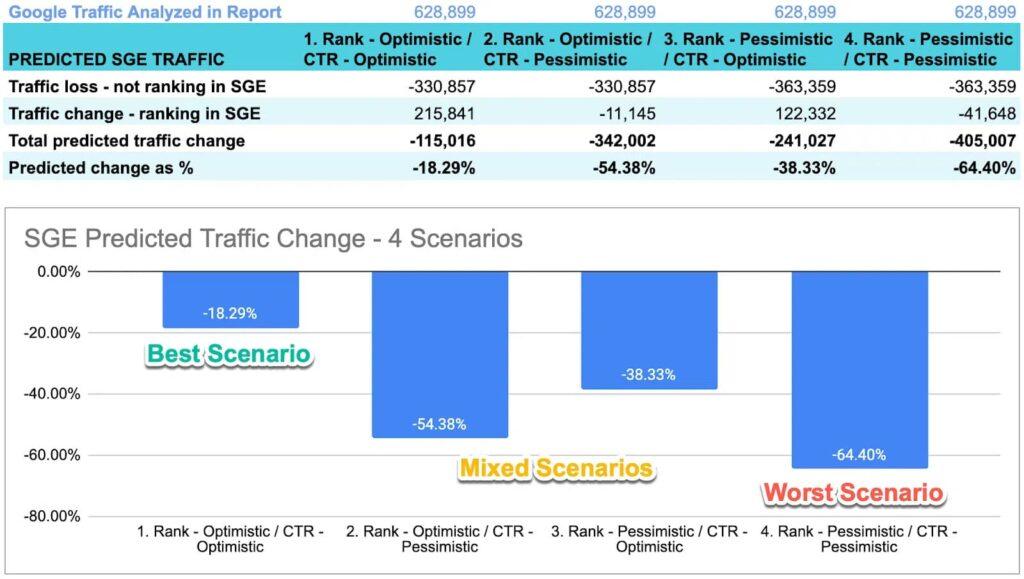
From their first observations, SEO experts have already noticed some troubling changes in search user behavior :
- Organic results get on average much fewer clicks, but the three first results now get an equal amount of clicks -compared to now, where the first result gets a significant portion of the traffic.
- Users spend more time on the SGE interface and less on companies’ websites for informational queries.
- Overall websites get much less aggregate organic traffic (from 18 to 64% less according to Agile SEO agency).
- These websites get proportionally more direct and branded traffic.
This means dramatic evolution for SEOs and marketers used to rely on Google to attract new visitors and customers.
How will inbound marketing change in an SGE era?
Once SGE is launched for everyone, it will reshape the way customers find and buy products online. They will still use Google to find company products and services they can trust, but they will find them indirectly. They will rely more on what Rand Fishkin calls “brand co-occurrences”.
Users will get the answers to their informational queries from Google’s AI. Then, when they are mature enough, they’ll inquire about the most reliable human experts to solve their problems. The AI will then quote brands and professionals related to their specific needs.
For example, what is the best accounting software for my accounting company? Or which sales solution should I leverage to prospect startups?
Marketers will make sure their brands “co-occur” with specific elements of the conversation between users and Google’s AI.
These brand co-occurrences will be defined by similar factors to SERP ranking :
- The relevance and authority of your content: The more you share insights on one specific subject, the more likely SGE will consider you an expert on this subject and recommend you.
- Your website’s popularity: The more people you attract to your site, the more likely SGE will recommend you on your specific subjects.
- Your online reputation: The more people say nice things about you on the Internet, the more likely SGE will be to recommend you to users. Conversely, the more bad reviews and comments are linked to your brands, the less likely it will mention you in conversations.
In other words, you’ll have to comply more than ever with the E-E-A-T standards (Expertise, Authoritativeness, Trustworthiness, and Personal Experience).
How can you adapt as marketers to SGE?
SGE is not yet widely available, but this doesn’t mean you shouldn’t prepare for the radical changes it will bring about. The new ways of attracting and converting online customers won’t be that far from the current marketing trends. But they will involve a more human-centered relationship with your brand. Here’s what you can do as a marketer to anticipate :
- Monitor which topics your brand is associated with: Which words your brand will be associated with will greatly influence your SGE “ranking”. You want to be present in the online conversations that matter for your business, so Google’s AI recommends you. Growing a community is one way to shape the conversation in your favor.
- Streamline your content on your most important keywords: Since the evolution of SERPs will dramatically decrease the visibility of brands in the SGE user journey, you want to focus your content on very specific content. Doubling down your content’s quality will help you beat the competitors.
- Put faces behind your brand: As users will mostly research via Google’s AI, they will want to reach out to real human experts they can trust. So you want to bring to light the most authoritative faces behind your company and develop their personal branding. Highlights your subject-matter experts, their personal and professional experience, and what they can bring to your customers.
Ready to overcome the challenges that SGE is bringing? Let’s get to work!


